Centralized Vs Decentralized Exchange: Which is Better?
A crypto exchange is a platform that allows its users to buy, sell and trade cryptocurrencies, like Bitcoin and Ethereum for fiat or other digital currencies.
Centralized exchanges were the first to enter the market. Therefore, they have more trading volume and popularity. But that’s changing now due to the recent surge in decentralized crypto exchanges. According to a report by The Block, decentralized exchanges surpassed $1 trillion in trading volume in 2021. That’s huge.
In this article about centralized vs decentralized exchange, we’ll discuss the differences between the two, their benefits and drawbacks. We’ll also answer some frequently asked questions about these crypto exchanges.
Centralized Exchanges Explained
As we learn more about centralized vs decentralized exchange, we’ll realize that centralized exchanges (CEXs) are crucial for cryptocurrency’s acceptance by the government. It helps maintain a nice common ground between the government and crypto users, where the government doesn’t see crypto as a threat and restricts its use.
What is a Centralized Exchange?
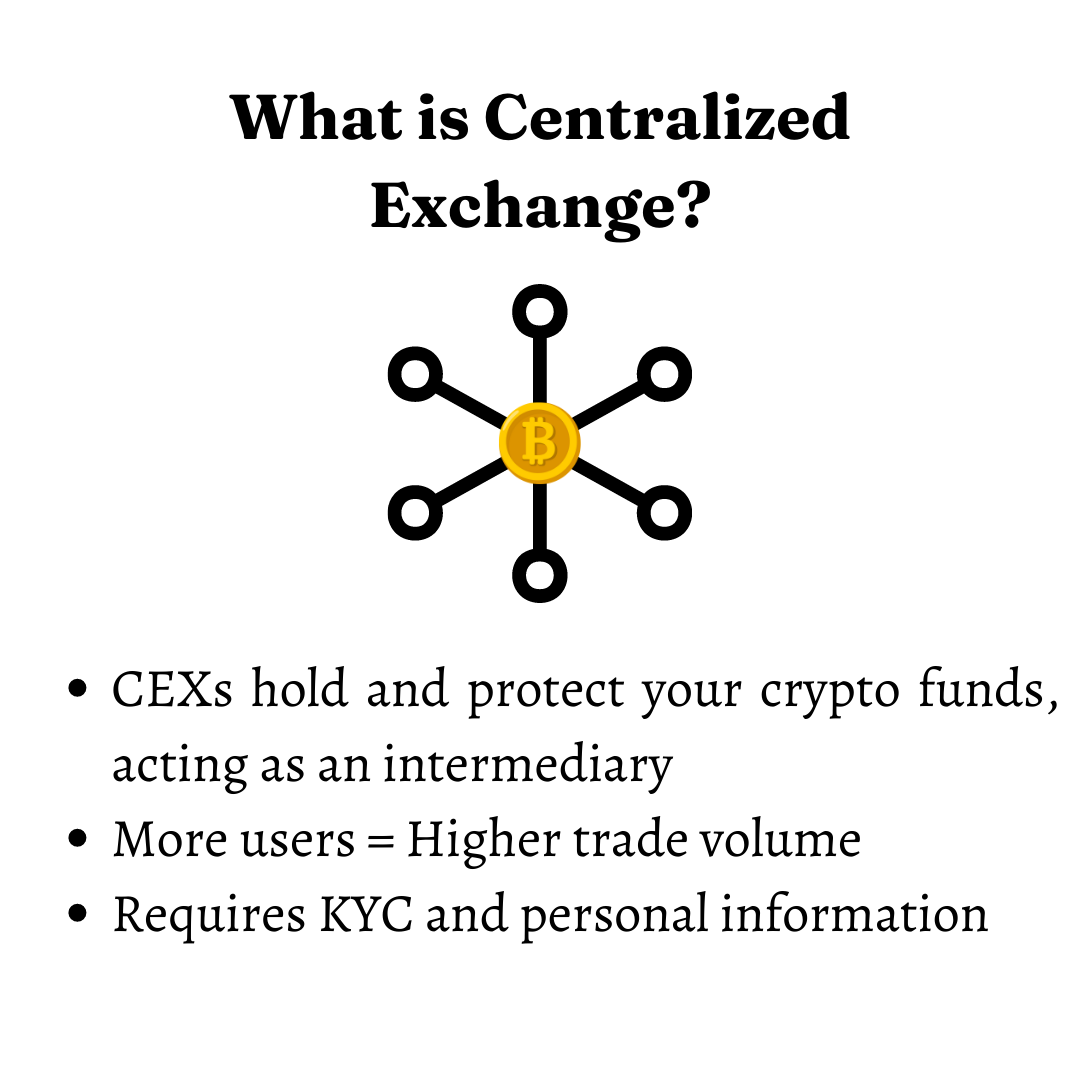
Much like traditional banks, centralized crypto exchanges hold and protect your crypto funds for you. These platforms act as intermediaries or middle men, bringing in all traders and investors in one place. Hence, the higher trade volume.
They also allow buying and selling of crypto with fiat currency, which decentralized exchanges don’t. That’s why centralized exchanges are much more popular and mainstream than decentralized exchanges.
To buy, sell or trade crypto with a CEX, you must submit your personal information to the platform and complete KYC. This is a problem since the majority of crypto users deeply care about their privacy. And part of the whole appeal of cryptocurrency is its anonymity. Taking that away might upset some people and push them away.
How Do Centralized Crypto Exchanges Work?
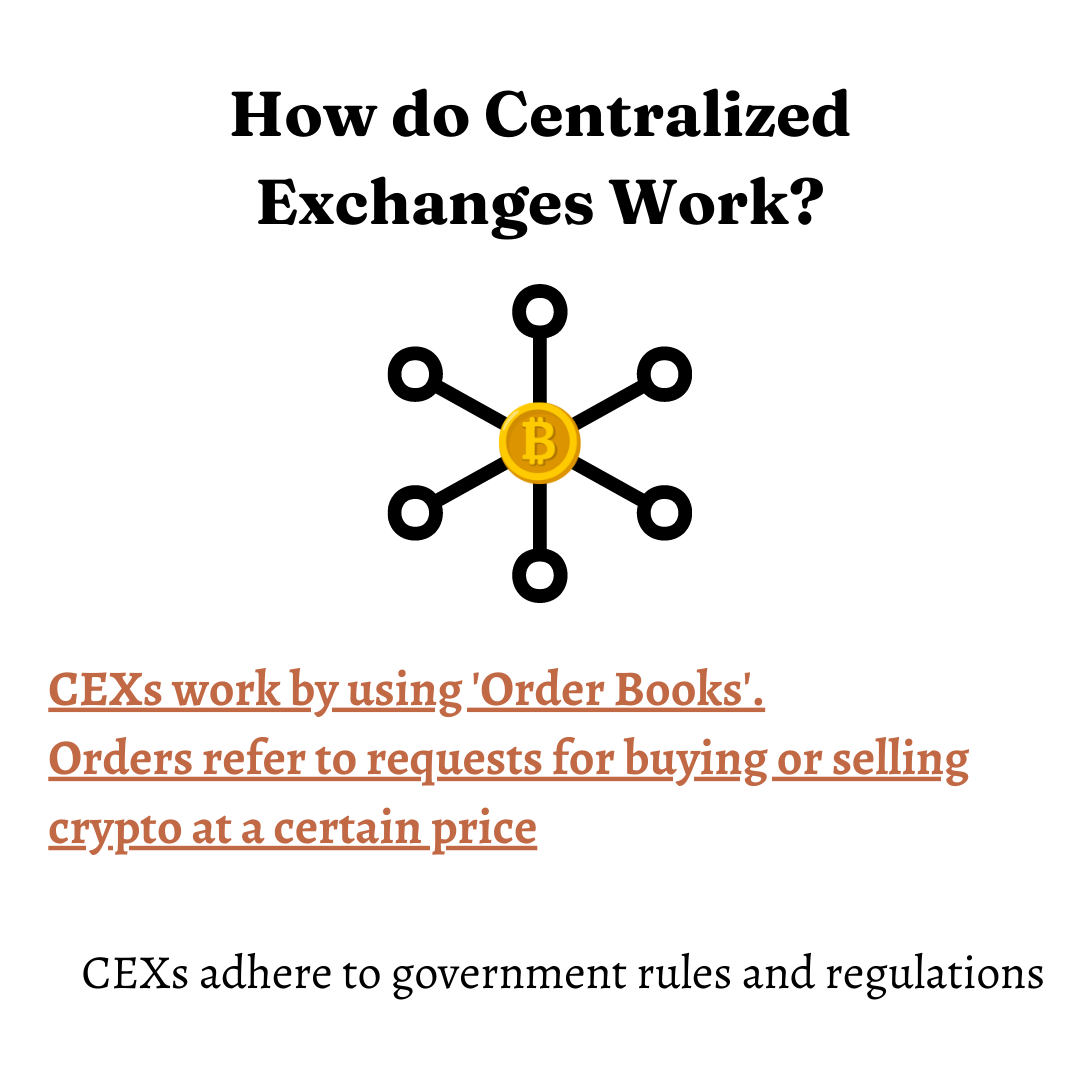
Centralized crypto exchanges work by using something called “order books”. ‘Orders’ refers to requests made by users for buying or selling crypto for fiat or other cryptos at a certain price. Unfortunately, most CEX platforms don’t reveal much about their internal mechanics and how their algorithm works.
Centralized exchanges comply with country and state government regulations as well. They require licenses and must adhere to the rules and regulations of the local regulatory authority. For example, Binance is available in most US states but Connecticut, Hawaii, New York, Texas, Vermont, Idaho and Louisiana.
Check out our list of best crypto exchange platforms for different US states.
Centralized Exchanges Examples
- Coinbase
- Binance
- Kraken
- Gemini
Centralized Exchanges and Taxes
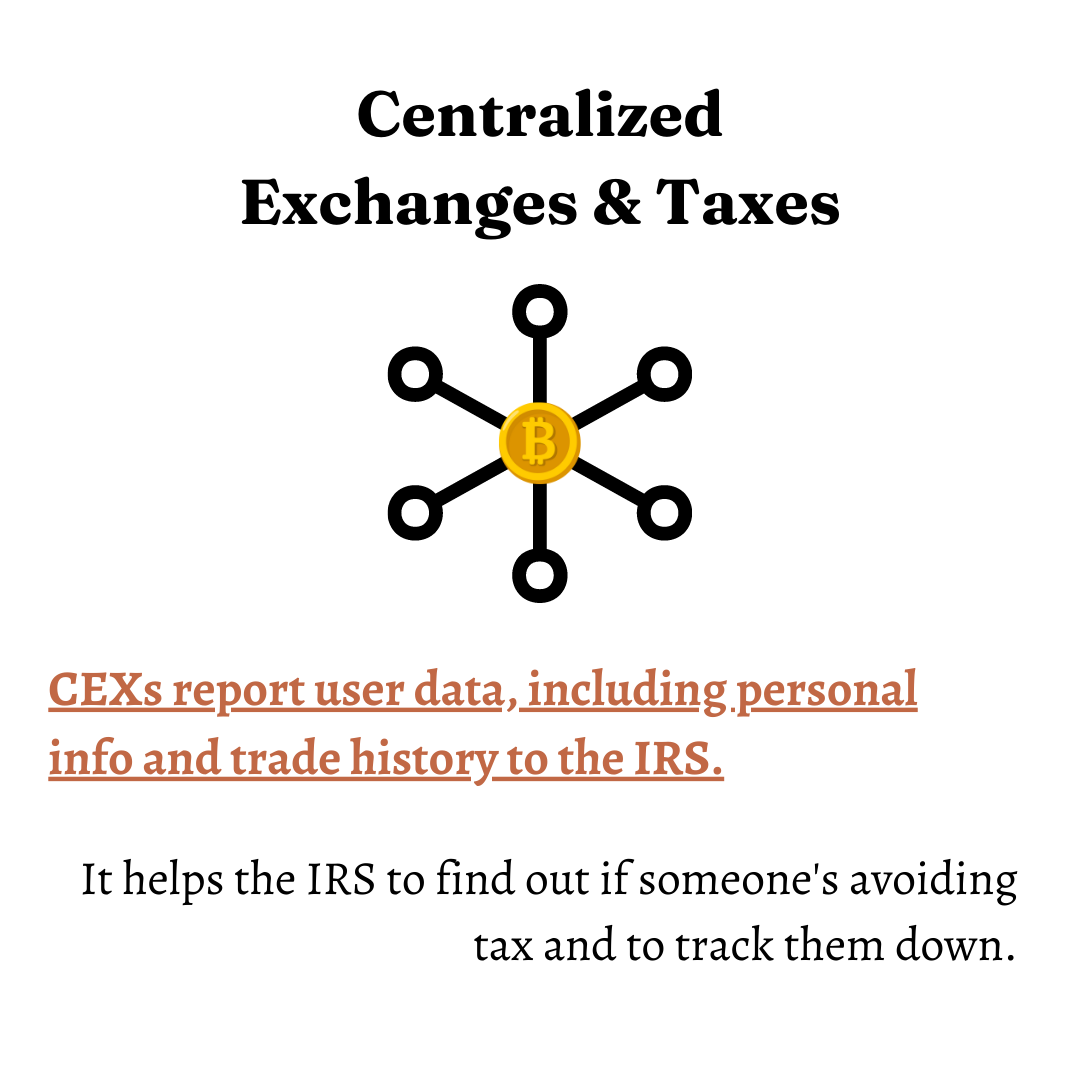
Since most centralized exchanges adhere to government rules and regulations, they also report user transactions and trade data to the IRS. It helps the IRS find out if someone’s avoiding taxes. It also makes it quite easy for them to track down these people.
Decentralized Exchanges Explained
Centralized exchanges are certainly more established, organized and popular, but they have their own limitations. Decentralized exchanges (DEXs) capitalize on these limitations and play them as their strengths, offering a viable alternative for the crypto community. However, DEXs come with their own set of benefits and drawbacks.
What is a Decentralized Exchange?
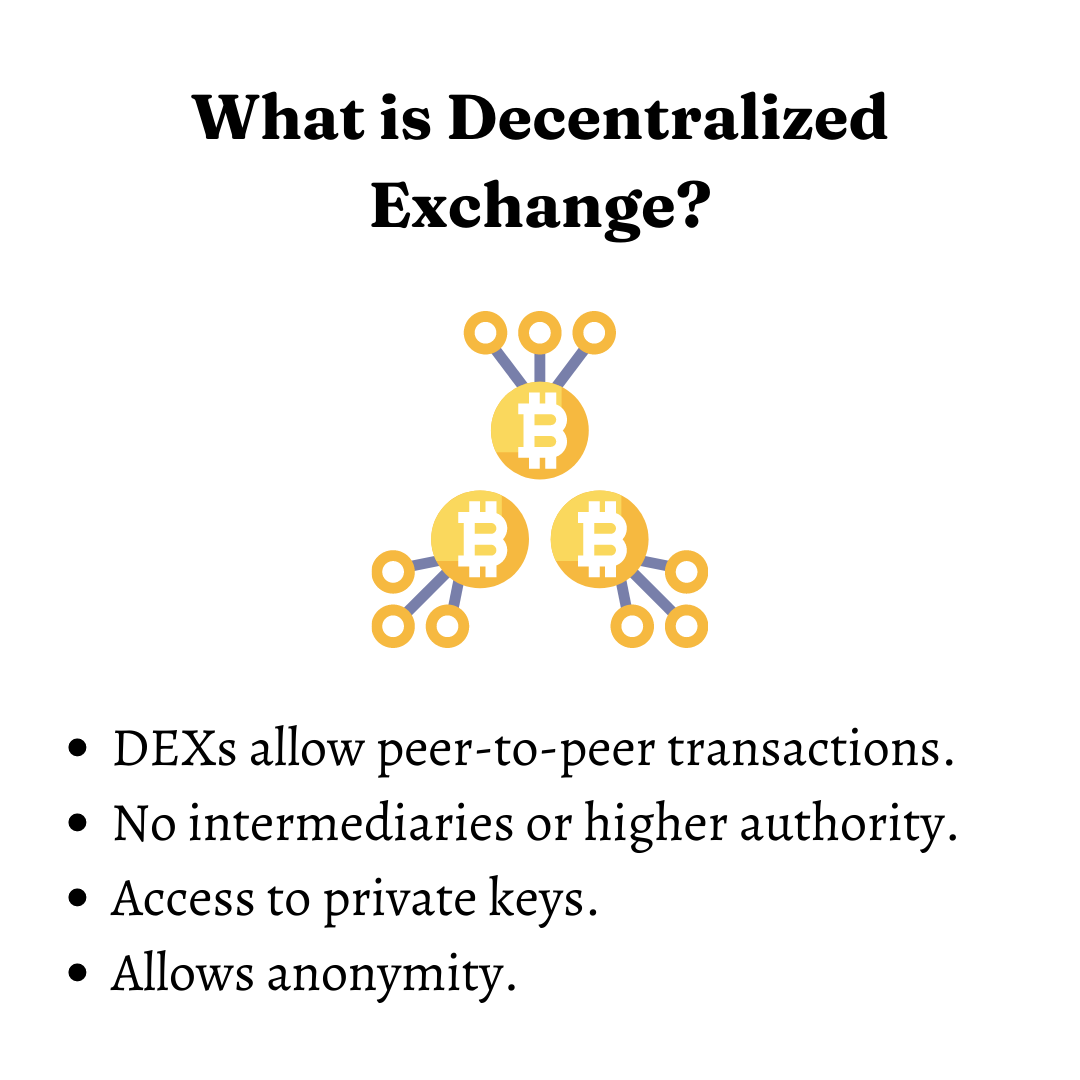
Decentralized exchanges are platforms that allow direct peer-to-peer transactions among traders without any intermediary or middleman managing their funds in the background.
Due to the absence of any intermediary or higher authority, users have access to their own private keys, which is not the case in centralized exchanges. It means that users have full control over their funds.
Unfortunately, most DEXs don’t allow crypto-to-fiat trades. They only allow crypto-to-crypto trades, which is a huge limiting factor for many crypto traders.
On the other hand, DEXs don’t require you to submit your personal information or KYC. This is great for people who want to maintain their anonymity.
There are mainly three types of decentralized exchanges – Automated market makers, Order books DEXs and DEX aggregators.
How Do Decentralized Crypto Exchanges Work?
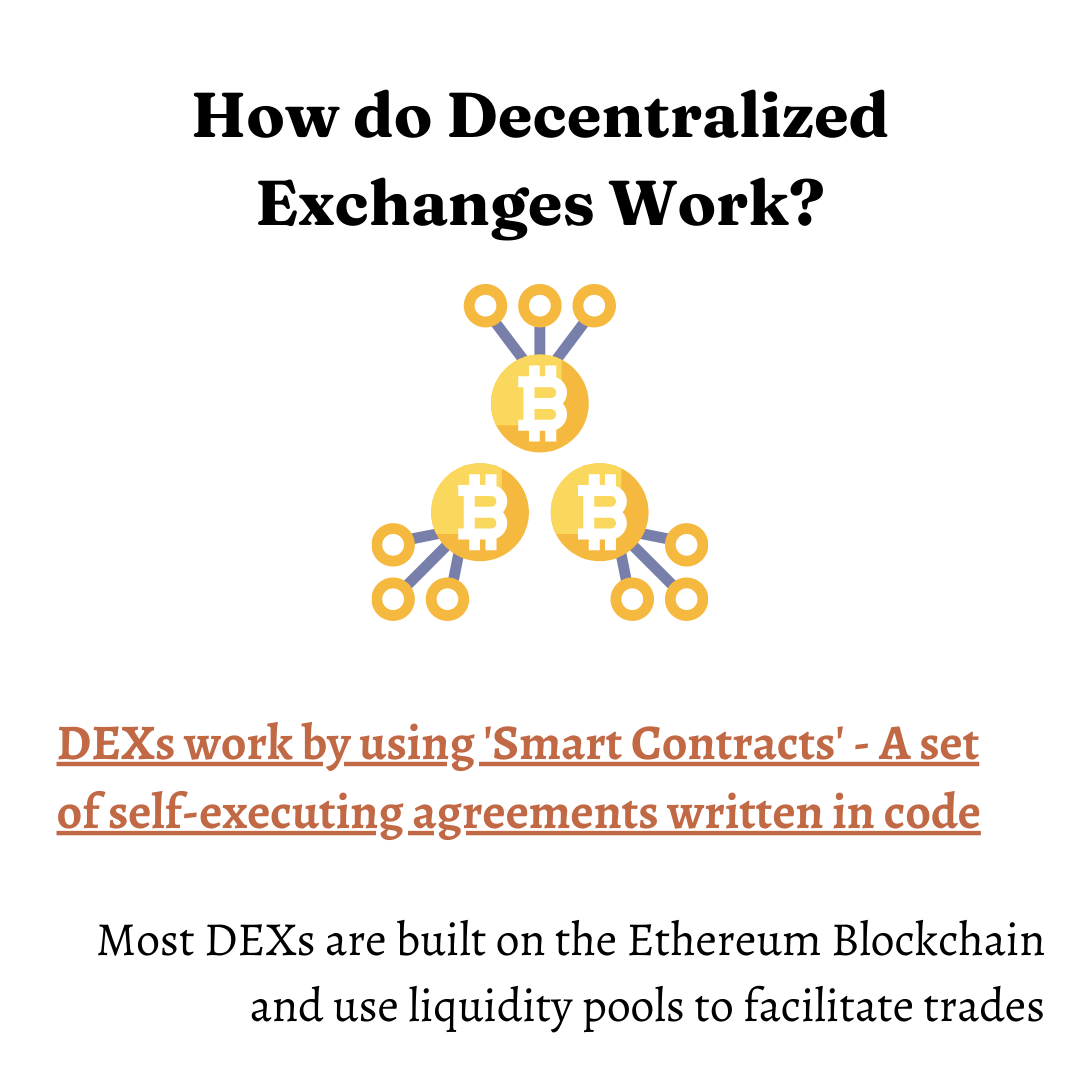
Decentralized exchanges operate via ‘Smart Contracts’ – a set of self-executing agreements written in the code itself.
Generally, most DEXs are built on open-source code, meaning anyone can see how the technology or the ‘code’ works. Projects built on open-source code allow other people to adapt and edit existing codes to create new, better platforms.
Also, most decentralized exchanges are built on the Ethereum-blockchain and use liquidity pools to facilitate trades and transactions.
Decentralized Exchanges Examples
- Curve (CRV)
- Uniswap (UNI)
- PancakeSwap (CAKE)
- SushiSwap (SUSHI)
- Balancer (BAL)
Decentralized Exchanges and Taxes
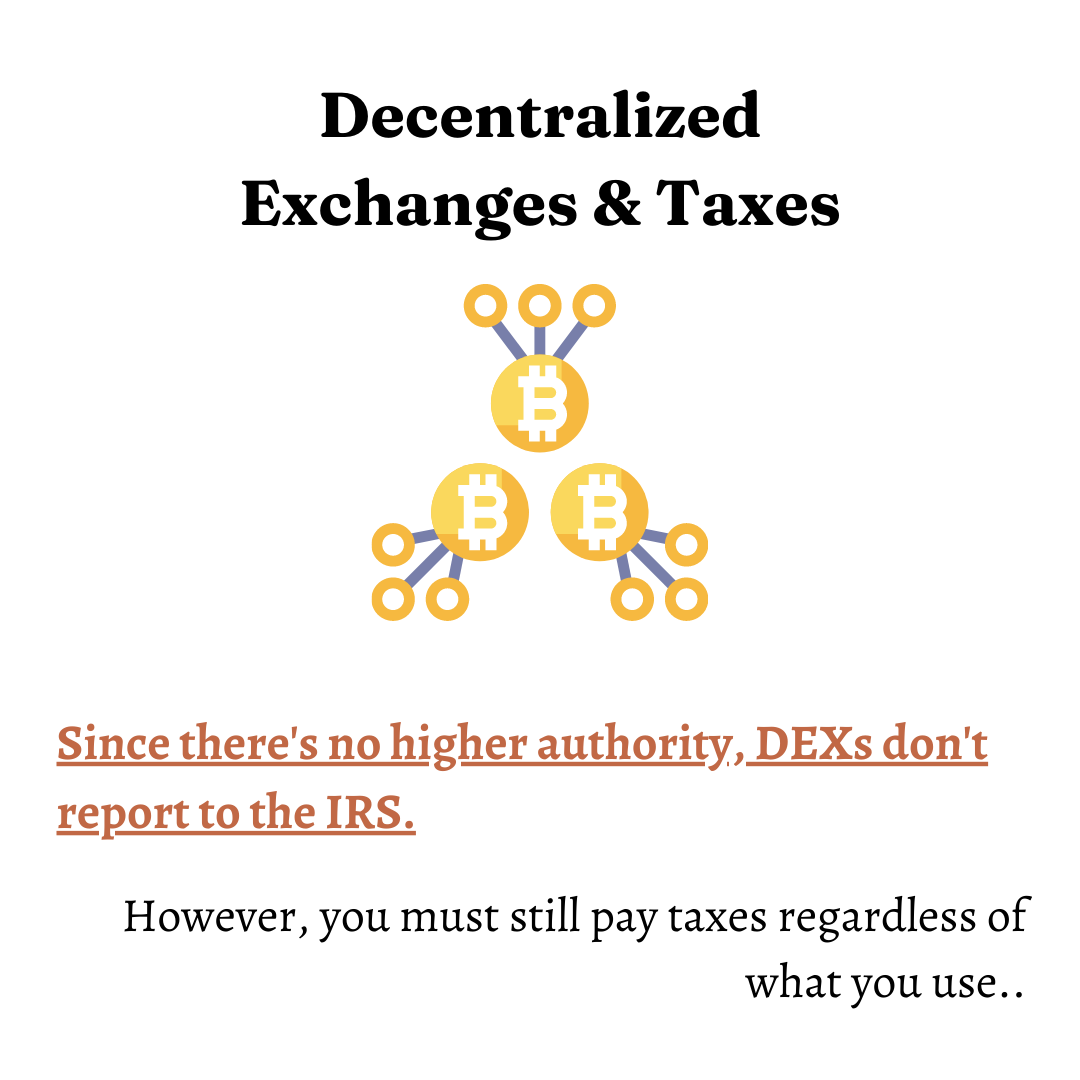
Since there are no CEOs, founders or other higher authorities running these platforms, they don’t have to follow government rules and regulations. Therefore, they don’t send user tax reports to the IRS because there’s no one to send them in the first place.
However, that doesn’t mean this will never change in the future or that you don’t have to pay your crypto taxes. Most crypto transactions are taxable events regardless of where it takes place. So, whether you use DEXs or CEXs, you must pay taxes.
Read our guide to crypto taxable events and how cryptocurrencies are taxed.
If you’re someone who uses multiple centralized and decentralized exchanges and wallets, you need Bitcoin.Tax.
Bitcoin.Tax will collect all your transaction and trade history from different platforms, calculate your capital gains and income taxes and prepare your tax reports, all in one place.
CEXs |
DEXs | |
| Control | Less control | Access to your own private keys |
| Security | Less secure | Difficult to hack |
| Popularity | More popular | Not so popular yet |
| Fees | Charges more | Only gas fee |
| Privacy | Less privacy | Allows anonymity |
| Features | More features | Not so many features yet |
| Regulation | Regulated by government guidelines | Doesn’t adhere to any government guidelines |
| Liquidity | More liquidity | Less liquidity |
| Speed | Instantaneously | 15 seconds to a minute |
Control
You get more control over your crypto funds in decentralized exchanges. They allow you access to your own private keys, which centralized exchanges don’t.
Security
Centralized exchanges are less secure than decentralized exchanges.
Why?
If a CEX platform gets hacked (which has already happened multiple times), all their users can lose their funds since they have access to everyone’s private keys.
In a DEX platform, users have access to their own private keys. So, even if someone hacks the platform, users’ funds are safe until an individual account gets hacked.
To counter this problem, many CEXs have started providing decentralized accounts to their users.
Popularity
Since they entered the market first and have more liquidity, trade volume and overall better infrastructure, centralized exchanges are more popular than decentralized exchanges as of now.
However, as more and more DEXs are emerging and taking over the matter, they might become more popular in the future.
Fees
Centralized exchanges impose fees on transactions and other trading activities, while decentralized exchanges don’t. CEXs take a percentage of the trade amount, while you only pay the gas fee in DEXs, which is really low, almost negligible.
Privacy
As we discussed before, decentralized exchanges allow full anonymity. While centralized exchanges? Not so much.
Features
As of now, centralized exchanges provide more and better features like margin trading. But as more and more decentralized exchanges are entering the market, they might come up with their own set of cool features.
Regulation
Centralized exchanges are regulated according to government rules and guidelines.
Decentralized exchanges don’t adhere to any government regulations since that’s the entire premise of decentralization. This means that DEXs can operate despite government bans and restrictions.
Liquidity
Centralized exchanges have higher liquidity because they are more popular, which means they have more users. And more users means more trades, hence, more liquidity.
Speed
Centralized exchanges are faster than decentralized exchanges. On average, transactions and trades in a CEX take place instantaneously, about ten milliseconds, to be specific.
DEXs, on the other hand, take anywhere from 15 seconds up to a minute to complete a transaction, which is considerably slower than CEXs.
FAQ
Are Decentralized Exchanges the Future?
It can definitely be. Considering how fast this new ecosystem of DEXs has grown in the last couple of years, the future looks bright for DEXs. However, they have many limitations that need to be fixed first.
How Many Decentralized Exchanges are there?
There are more than 35 decentralized exchanges, Uniswap, SushiSwap and Bancor being some of the most popular ones.
Are Decentralized Exchanges Legal?
Whether decentralized exchanges are legal or not is still unclear. However, they are attracting a lot of attention from the government lately.
Are Decentralized Exchanges Safe?
Just like any centralized exchange, DEXs have their own set of risks, most notably, the risk of liquidity. Other than that, since DEXs are not regulated by the government, you’ll receive limited support in case of hacking or theft.